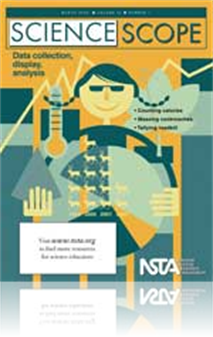All Science Scope resources
Journal Article
Editor’s Roundtable: Essential data
Answering a question or proposing an explanation based on evidence gathered from observations and measurements is at the heart of scientific inquiry. To develop this ability, teachers should provide repeated opportunities for students to generate que...
Journal Article
Tired and True: Message in a bottle—Analyzing reaction rates using gas pressure sensors
One of the many ways to engage students in science is by using probes or computerized devices that respond in real time to changes. In the following learning cycle lesson, an after-school science and mathematics club consisting of about 20 students u...
Journal Article
Science Sampler: Laws of motion
What do you get when you cross an electronic whiteboard, online videos, and a room full of sixth graders? This may perhaps sound like an uncontrollable mix, but these simple ingredients create an interesting way to reinforce student understanding of ...
Journal Article
Science Sampler: Making connections in Earth science using local data
Examining data provides a unique opportunity to have students work actively with various technologies, such as computers or graphing calculators. Students can import data into spreadsheet software, execute mathematical calculations, create data graph...
Journal Article
Chow Down! Using Madagascar Hissing Cockroaches to Explore Basic Nutrition Concepts
The Madagascar hissing cockroach gromphadorhina portentosa) is one of the most exciting and enjoyable animals to incorporate into your science curriculum. Madagascar hissing cockroaches (MHCs) do not bite, are easy to handle, produce little odor comp...
Journal Article
Science Sampler: Making a leap toward concrete inferences
Scientists are always working at refining their observations to help them make that leap toward stronger inferences. Teaching students to make inferences means showing them how to take their careful observations and use them to explain natural phenom...
Journal Article
With the use of technology such as Global Positioning System (GPS) units and Google Earth for a simple-machine scavenger hunt, you will transform a standard identification activity into an exciting learning experience that motivates students, incorpo...
Journal Article
Science Sampler: Using seashells to teach classification
Everyone loves the beach. Unfortunately, most schools don’t have access to beachfront property. So, why not bring the beach to the classroom? This seashell lab investigation is great because students enjoy it, they learn that science is a way to so...
Journal Article
Biological Clocks and Circadian Rhythms
The study of biological clocks and circadian rhythms is an excellent way to address the inquiry strand in the National Science Education Standards (NSES) (NRC 1996). Students can study these everyday phenomena by designing experiments, gathering and ...
Journal Article
Tried and True: Chipping away at the rock cycle
The National Science Education Standards recommend that middle school students have a clear understanding of the history, composition, and formative processes that shape the Earth. To accomplish this goal, the authors use an engaging activity that us...
Journal Article
Why not combine the use of technology with the excitement of a scavenger hunt that moves middle-level students out into the “wilds” of their school campus to classify plants? In the lesson plan described here, students embark on a botanical scav...
Journal Article
Scope on Safety: Avoiding the burn
A major cause of injuries in middle and high school science laboratories can be summarized by one word—heat. Heated liquids, glassware, and hot plates are the most common source of student burns in the lab. Training—the key to preventing most bur...



